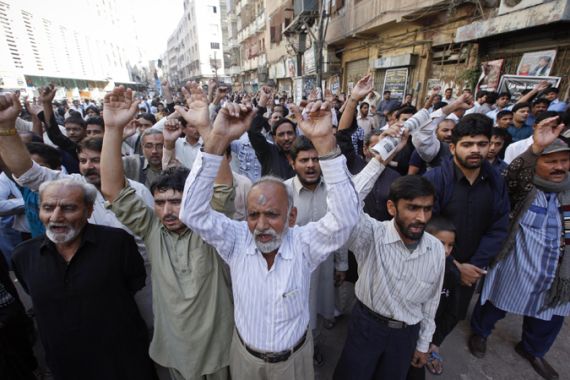Pakistan Shia families refuse to bury dead
Families of dozens of victims from Thursday’s bombing in Quetta stage sit-in to demand greater government protection.

Families of Shia Muslims targeted in twin bombings that killed at least 86 people in the Pakistani city of Quetta are refusing to bury their dead unless the government does more to protect them from increasing violence targeting their sect.
Protesters in Quetta have staged a sit-in since Friday evening, and demonstrations were held in solidarity with them in other cities, including Lahore, Karachi and Islamabad, on both Friday and Saturday.
“It is winter, it is extremely cold in Quetta, we’re told it was raining last night, and over 20 hours after those people had been killed in that indiscriminate bombing, the Shia community are sitting there, thousands of them, and they want an answer from the government. They want the security forces to take over control of the city and to provide security to the people,” reported Al Jazeera’s Kamal Hyder from Islamabad.
The attack on a billiards hall on Thursday night in the southwestern city marked a bloody start to the new year after a human rights group said 2012 was the deadliest ever for Shias in the majority Sunni Muslim country.
Many of the attacks last year were carried out by Lashkar-e-Jhangvi, a Sunni extremist group that claimed responsibility for the bombing of the billiards hall.
The attack was one of three that took place across Pakistan on Thursday, killing 120 people in the country’s deadliest day in five years.
The billiards hall was located in a predominantly Shia area, and most of the dead and wounded were from the sect.
Members of the community laid about 50 of their dead on the street on Friday, saying that they would not bury them until the government improves security in the area.
Islamic custom dictates the dead should be buried as soon possible.
Authorities said that the protest had ended late on Friday night, but by Saturday morning, many demonstrators were still holding their positions.
‘Stop killing’
“We sit in protest against oppression. We will continue our sit in protest until the government fulfills our demands,” said Qayyum Changazi.
Zakia Ishaq, a female mourner, said she had been protesting for 20 hours, enduring freezing temperatures through the night.
“We are demanding, please stop killing Hazara,” she said.
Young men also set tires on fire and blocked a nearby road in protest.
“We want safety for all our sects, and all security measures should be taken for our safety, said Fida Hussain, a relative of one of the victims. “We will not bury them until the government fulfills all our demands.”
Pakistan’s intelligence agencies helped nurture Sunni militant groups like Lashkar-e-Jhangvi in the 1980s and 1990s to counter a perceived threat from neighbouring Iran, which is mostly Shia.
Pakistan banned Lashkar-e-Jhangvi in 2001, but the group continues to operate fairly freely.
Human Rights Watch on Thursday accused the Pakistani military and other security agencies of “callousness and indifference” when it came to the killing of Shias.
‘Hell on Earth’
Resident Jan Ali described the billiards hall targeted on Thursday as a neighborhood gathering spot where young and old often waited in line to play on its six tables.
After the attack, “it was a scene like hell on Earth”, said Ali.
“Rescue people were carrying out dead and injured, people bleeding and crying, and rushing them toward ambulances. I have never seen such a horrifying situation in my life.”
One of those killed was a young human rights activist named Irfan Ali.
“He was a very active, energetic activist,” said Tahir Hussain, a lawyer and vice chairman of the Human Rights Commission of Pakistan’s Balochistan chapter.
He said Ali was associated with the HRCP for the last 10 years, often writing about social issues and oppression of the Shia Hazara community.
Ethnic Hazaras migrated from Afghanistan more than a century ago and have been the targets of dozens of attacks over the past year, but Thursday’s was by far the bloodiest.